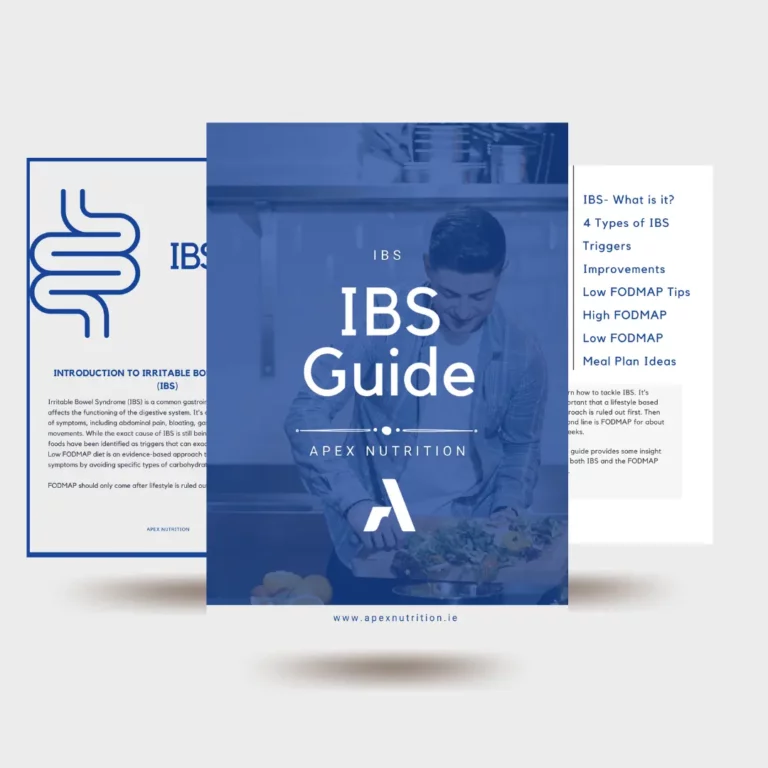
Navigating Digestive Health with FODMAP:
Expert Advice from a Registered Dietician
Daniel Murphy // Dietitian // Nov 23

Low FODMAP Diet & Irritable Bowel Syndrome (IBS)
When it comes to digestive health & Irritable Bowel Syndrome (IBS), understanding FODMAPs can be a game-changer. As a Registered Dietician, I wanted to share my expertise. Hopefully this article will help you navigate the intricate world of FODMAPs. Get ready to explore invaluable insights and reliable guidance to manage digestive issues like IBS effectively.
Amidst the array of dietary advice available, finding guidance tailored to your specific needs can be daunting. Within these pages, gain a comprehensive understanding of FODMAPs and how they can impact digestive health. Unlock insider tips, meal planning strategies, and empowering advice to regain control over digestive wellness. From unraveling the complexities of FODMAPs to discovering practical, delicious recipes, this article equips you with the tools needed to thrive.
Embark on this journey to amplify your digestive well-being and embrace a life of vibrant health.
Table of Contents
Understanding FODMAPs
FODMAPs, an acronym for Fermentable Oligosaccharides, Disaccharides, Monosaccharides, and Polyols, are a group of short-chain carbohydrates that are poorly absorbed in the small intestine. This can lead to various digestive symptoms in individuals with irritable bowel syndrome (IBS) and other digestive disorders.
These carbohydrates can be found in a wide range of foods, including certain fruits, vegetables, grains, dairy products, and sweeteners. When consumed in high amounts, FODMAPs have been linked to bloating, gas, abdominal pain, diarrhoea, constipation and other gastrointestinal discomfort.
Understanding the role of FODMAPs in the digestive process is crucial for those seeking relief from digestive symptoms and aiming to improve their overall well-being. By identifying and managing FODMAP intake, individuals can potentially reduce or alleviate their digestive discomfort and enhance their quality of life.
The Impact of FODMAPs on Digestive Health
The impact of FODMAPs on digestive health can be significant, particularly for individuals with conditions such as IBS, Crohn’s disease, ulcerative colitis, and other functional gastrointestinal disorders. The consumption of high-FODMAP foods can trigger symptoms such as bloating, cramping, diarrhea, and constipation, leading to discomfort and a diminished quality of life.
For many individuals, the effects of FODMAPs on their digestive health can be disruptive and distressing, impacting their daily activities, work, social interactions, and overall well-being. By recognising the impact of FODMAPs and implementing dietary modifications, individuals can take proactive steps towards managing their digestive symptoms and reclaiming control over their health.
The intricate relationship between FODMAPs and digestive health underscores the importance of personalised dietary guidance and support. This is best under the surveillance of qualified professionals, such as Registered Dieticians. They can provide tailored recommendations based on individual needs and health goals.
Low Fodmap Diets usually are recommended as a second line intervention to IBS. Meaning diet and lifestyle is much more important to focus on first. It is also only recommended to follow a Low Fodmap diet for about 6 weeks. It can be quite restrictive.
Daniel Murphy - Registered Dietician
Getting Started with a Low FODMAP Diet
The Low Fodmap diet is usually split into 2 phases over a period of about 6 weeks. These are:
–Elimination Phase: Process of Eliminating FODMAPs from the diet.
–Reintroduction Phase: Reintroducing FODMAPs back into your nutrition.
In the elimination phase it can be beneficial to start a food diary, recording symptoms and potential food triggers. This can help identify potential triggers and monitor progress over time, allowing for adjustments and refinements to optimise digestive comfort and overall well-being.
In the reintroduction phase, you slowly reintroduce FODMAPs to the diet. This is an important step as FODMAPs feed our gut. This is the reason behind only doing 6 weeks. If you were to do Low FODMAP long term it could have negative effects on gut health.
Check out our Free IBS Guide below for more guidance.
Download Our Free IBS Guide
Struggling with IBS and want to learn more about the Fodmap diet?
Why not download our free guide. This provides a background into IBS and lists some common foods found on a Low Fodmap Diet.

Tips for Navigating Social Situations and Dining Out on a Low FODMAP Diet
Navigating social gatherings and dining out can present unique challenges for individuals following a low FODMAP diet. However, with thoughtful planning and effective communication, it is possible to enjoy social occasions and restaurant experiences while adhering to dietary restrictions.
When attending events or gatherings, consider communicating and check in advance to discuss dietary needs may be necessary at this time. Bringing a dish or snack that aligns with a low FODMAP diet can also ensure that there are suitable options available. It can help to undertake this style of diet when social occasions are quiet.
When dining out at restaurants, researching menus in advance can be beneficial. Many restaurants are willing to accommodate dietary preferences and restrictions.
Additionally, cultivating a supportive network of family, friends, and colleagues who understand and respect dietary needs can contribute to a more inclusive and enjoyable social experience. By advocating for one’s own well-being and communicating openly about dietary requirements, individuals can navigate social situations with greater ease and confidence.
Working with a Registered Dietician: What to Expect
Partnering with a Registered Dietician who specialises in FODMAPs and digestive health can be a transformative and empowering experience. At Apex Nutrition individuals can receive personalised guidance, evidence-based recommendations, and ongoing support tailored to their unique needs and health objectives.
Our Registered Dieticians are equipped with the knowledge, expertise, and resources to create individualised meal plans, offer practical dietary advice, and address specific concerns related to FODMAP management. Through collaborative discussions and assessments, dieticians work with individuals to develop strategies for navigating dietary challenges, implementing lifestyle modifications, and fostering sustainable habits for long-term digestive wellness.
Clients can expect their dietitian to provide comprehensive education about FODMAPs, including food sources, portion control, label reading, and practical tips for meal preparation and dining out. Furthermore, dieticians play a vital role in monitoring progress, adjusting dietary recommendations, and offering encouragement and motivation throughout the journey to improved digestive health.

Success Stories from Apex Nutrition
Meet Claire. Claire was an Apex member suffering heavily from IBS. She had periods of constipation and diarrhoea. She’d always experience pain. We attempted first line lifestyle changes including stress reduction, limiting alcohol and reducing fast food. After adjusting the lifestyle for these, we then explored the Low FODMAP diet for a 6 week period. Check out Claire’s story below.
Claire’s IBS & Fodmap Story
“I had been struggling with persistent stomach issues and discomfort due to my IBS for a long time. I tried making some initial lifestyle adjustments, but they only provided temporary relief. It felt like a never-ending battle. Then, Dan introduced me to the low FODMAP diet and I decided to give it a shot. I committed to following it for six weeks, and the results were astonishing. My stomach issues virtually disappeared, and I was able to reintroduce a variety of foods into my diet without any problems. I couldn’t believe the positive transformation I experienced. The low FODMAP diet truly turned my life around, allowing me to enjoy a wide range of delicious foods while keeping my IBS symptoms at bay. It’s been a game-changer for me, and I’m so thankful for finding this solution.”

